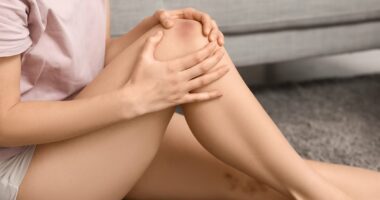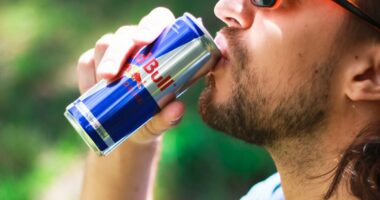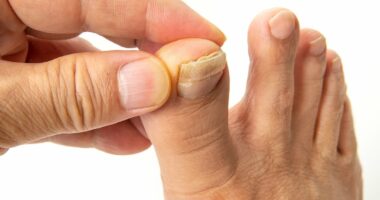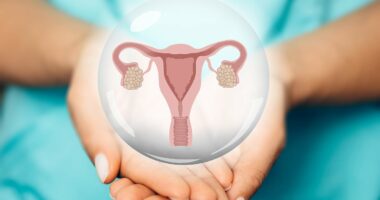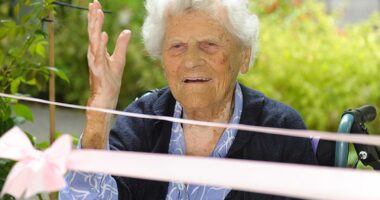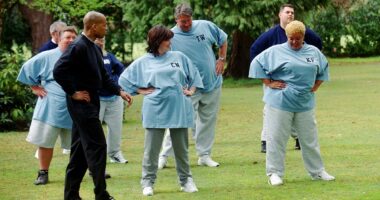Share this @internewscast.com
Boffins believe drinking one energy drink a month could lead to poor sleep in young people.
A study found as little as one to three cans a month could have an effect on young people. With those aged 18 to 35 losing half an hour of sleep a day compared to people who don’t drink them.
Men who consume two or three energy drinks a week were 35% more likely to stay up past midnight. With 52% of those more likely to sleep under six hours.
The study found 60% were more likely to wake in the night than those who did not or rarely drank energy drinks. Among women, they were 20% more likely to have a later bedtime, 58% more likely to sleep less than six hours, and 24% more likely to wake in the night.
It comes as a study published last week said the sale of energy drinks to young people and children in the UK should be banned. It claimed they have links to anxiety, stress and even suicidal thoughts.
Energy drinks often contain high levels of caffeine and sugar. They are marketed as providing people with an energy boost.
The Government has consulted on a proposal to end the sale of energy drinks to children under 16 in England and has said it will set out a response in due course. In the meantime, some larger retailers and supermarkets have voluntarily introduced a ban on the sale of energy drinks to children under 16.
Researchers have said, however, that the drinks can still be easily bought by children in places such as corner shops. The latest study, published in BMJ Open and based on 53,266 Norwegian students, found the drinks are popular with young people.
Students in the study were asked how often they drank energy drinks, with responses including daily, weekly (including once a week, two to three times a week, and four to six times a week), monthly (one to three times), and seldom/never. They were also asked detailed questions about their sleep patterns, such as when they went to bed and got up, how long it took them to fall asleep and if they woke in the night.
Insomnia was defined as problems falling and staying asleep and waking early on at least three nights a week, plus daytime sleepiness and tiredness for at least three days of the week, for at least three months. Overall, half of women in the study said they never consumed energy drinks, while the figure was 40% in men.
Of those who did drink them, 5.5% of women said they drank them four to six times a week and just over 3% drank them every day. In men, 8% drank them four to six times a week and 5% drank them every day.
The results showed that people consuming the drinks daily had more issues overall with waking after falling asleep and took longer to fall asleep, and slept less overall than those not drinking them. The study also found that the more people drank, the less sleep they had.
Students in the study were asked how often they drank energy drinks, with responses including daily, weekly (including once a week, two to three times a week, and four to six times a week), monthly (one to three times), and seldom/never. They were also asked detailed questions about their sleep patterns, such as when they went to bed and got up, how long it took them to fall asleep and if they woke in the night.
Insomnia was defined as problems falling and staying asleep and waking early on at least three nights a week, plus daytime sleepiness and tiredness for at least three days of the week, for at least three months. Overall, half of women in the study said they never consumed energy drinks, while the figure was 40% in men.
Of those who did drink them, 5.5% of women said they drank them four to six times a week and just over 3% drank them every day. In men, 8% drank them four to six times a week and 5% drank them every day.
The results showed that people consuming the drinks daily had more issues overall with waking after falling asleep and took longer to fall asleep, and slept less overall than those not drinking them. The study also found that the more people drank, the less sleep they had.
For women drinking energy drinks daily, 51% reported suffering insomnia, compared with 33% of women who drank the drinks occasionally or never. Meanwhile, in men, 37% of daily drinkers suffered insomnia, compared with 22% of those who rarely or never had the drinks.
Men who were daily drinkers were more than twice as likely to say they slept fewer than six hours a night as infrequent drinkers, while women were 87% more likely to do so. But even students having one to three energy drinks a month had bigger sleep issues than those who never touched them, the study suggested.
The researchers warned they had not established that energy drinks cause these effects and acknowledged that reverse causality – whereby energy drink consumption might be a consequence of poor sleep rather than the other way round – might explain the link.
However, they said: “The results from the current study show that there is a robust association between the frequency of (energy drink) consumption and the different sleep parameters.”
The experts were drawn from across Norway, including the Universities of Bergen and Oslo. British Soft Drinks Association director general, Gavin Partington, said: “As the authors themselves acknowledge, this is an observational study that does not prove cause.
“Energy drinks that have a high caffeine content are legally required to be labelled as having a high caffeine content although it’s worth noting that according to the European Food Safety Authority, the average 250ml energy drink contains 80mg of caffeine, the same amount as a 60ml espresso but less than a 200ml cup of filter coffee.
“BSDA members are committed to supporting the responsible sale of energy drinks and our voluntary Code of Practice on energy drinks, which was introduced by and for BSDA members in 2010, contains a number of stringent points on responsible marketing.”

